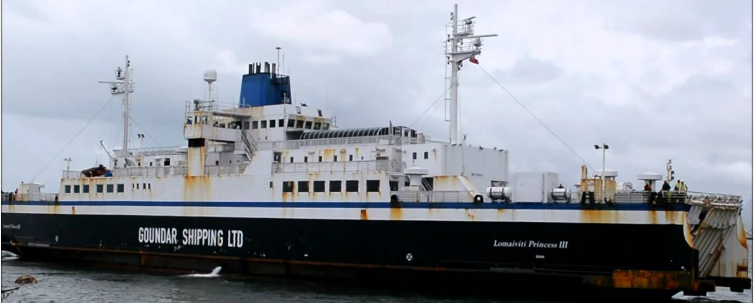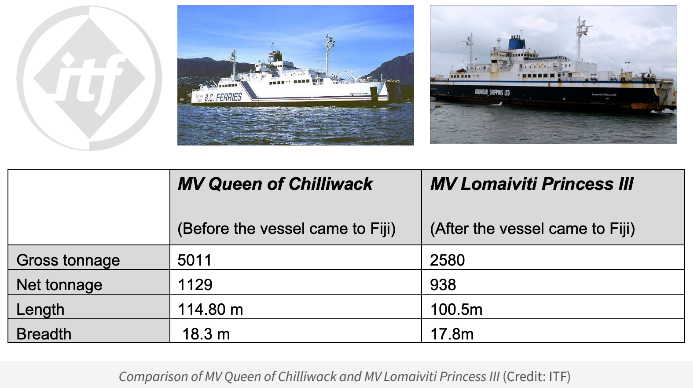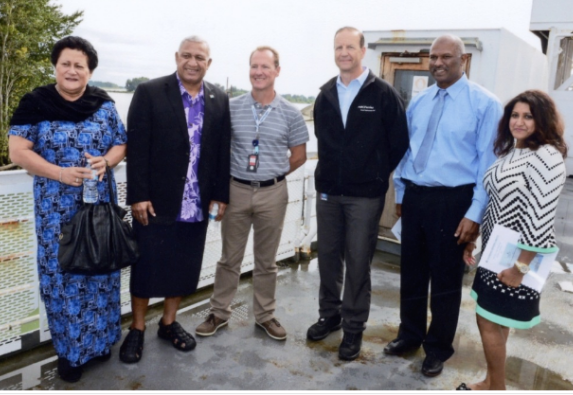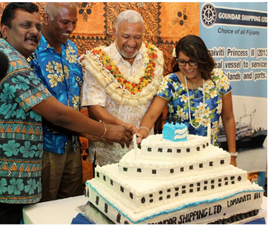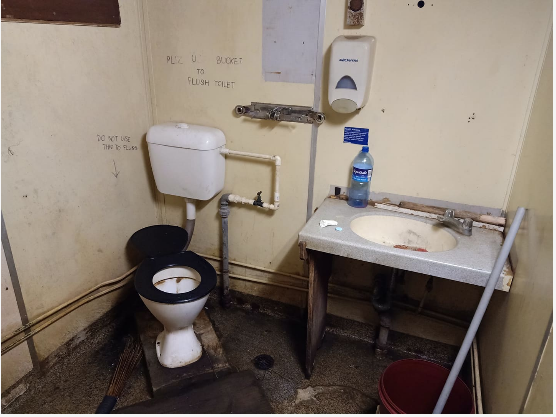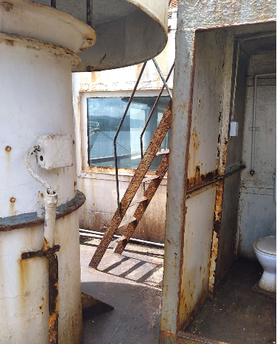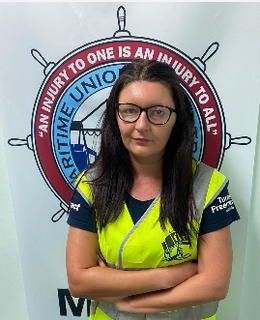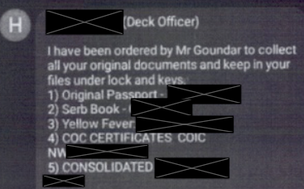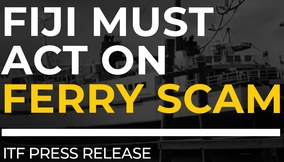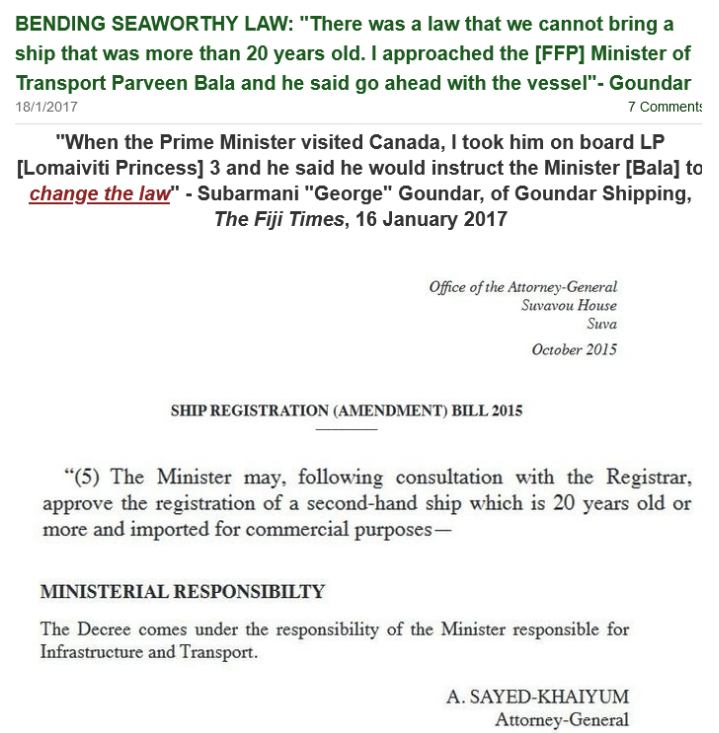*The Queen of Chilliwack had a length of 114 meters and a gross tonnage of 5,011 gt and measured 114.8 meters long by 18.3 meters beam
*In 2015 she was sold to Goundar Shipping of Fiji and renamed Lomaiviti Princess III. Now, while the Equasis data base still shows her gross tonnage as 5,011 gt, the International Transport Workers’ Federation (ITF) says that its inspectors have received information indicating that Goundar Shipping Limited may have registered the MV Lomaiviti Princess III at 14 meters shorter and with a 2.431 lower gross tonnage that the vessel’s previous registration in Canada
*The ITF says that “the paperwork discrepancy has meant the ferry has likely not received critical maintenance required for a vessel of its size, nor has it been staffed with crew of required skill and experience according to Fijian regulations and international rules.”
*On Wednesday, March 24, an ITF inspector wrote to the Maritime Safety Authority of Fiji (MSAF) officially raising the discrepancy:
“Should this information be accurate, and we suspect it is, then this raises red flags for the ITF,” the ITF’s Sarah Maguire wrote the MSAF.
“We believe this vessel and others in Goundar’s fleet are not operating safely, have not received dry dock, and are being operated by crew who are under-qualified.”
*According to the ITF, Fiji’s regulations stipulate vessels of the Queen of Chilliwack’s size need a larger, more qualified crew than vessels of the smaller size that, it says, Goundar registered the ship as with MSAF in 2015
My wife is financing all my investments in Fiji from Canada”
George 'Subarmani' Goundar, 30 September 2014, Fiji Sun
Goundar's fleet is considered old, and the seafarers felt unsafe with the lack of maintenance on the vessels (Credit: ITF)Transport workers’ unions are welcoming reports that Fijian authorities have launched an investigation into Goundar Shipping’s ongoing abusive treatment of dozens of Filipino seafarers. The probe must cover all areas of Goundar’s ‘seafarer scam’ and lead to real change to be credible, the unions warn. |
Last week, the International Transport Workers’ Federation (ITF) revealed Goundar had fired and abandoned three seafarers after the workers began asking local union representatives about their rights.
ITF investigations this week have uncovered that staff at Goundar Shipping tried to confiscate a number of seafarers’ passports and other documents upon beginning work with the company. It is alleged that the company would not allow the seafarers to work until they did so. Withholding travel documents and forcing persons to work under threat are both offences under Fiji’s human trafficking laws.
ITF investigations this week have uncovered that staff at Goundar Shipping tried to confiscate a number of seafarers’ passports and other documents upon beginning work with the company. It is alleged that the company would not allow the seafarers to work until they did so. Withholding travel documents and forcing persons to work under threat are both offences under Fiji’s human trafficking laws.
| “We welcome news of a Police investigation into Goundar Shipping after so many months of inaction from Fijian authorities. But it is important that any investigation addresses the full list of allegations against Goundar Shipping. We’re talking human trafficking, slavery, deception, labour law violations, intimidation, the list goes on..,” said ITF Inspector Sarah Maguire. “It’s clear now that more than 20 Filipino seafarers were lured to Fiji to operate an ageing ferry fleet under false pretences, only to find 50-70 percent lower wages, unsafe conditions and no return ticket home as promised by Goundar shipping and required under Fiji’s immigration laws. When they arrived, Goundar cut the seafarers’ pay further, undercounted their hours, and generally treated them with contempt.” Goundar also cut workers’ food rations, eventually to just bread and tea, and pushed seafarers to work an unsafe number of hours, many of them without commensurate pay. | |
Maguire said preliminary calculations by the ITF showed the seafarers had been paid as little as 75 cents per hour in recent months by Goundar for the hours they worked. At least one seafarer, a cook, had a take home pay of just 40 cents per hour. He was paid for just seven hours per week, despite working 98-hour weeks. Like many of Goundar’s workforce, he worked 14 hours a day, seven days a week.
The ITF estimates Goundar Shipping owes the seafarers collectively more than AUD $250,000 in unpaid wages.
“Goundar’s abusive tactics are not limited to taking passports – his illegal pay cuts kept these seafarers too poor to afford tickets home. They’re trapped there – working for a man they despise. And if they complain, his company sacks them and dumps them at the nearest port with absolutely nothing. They’re a million miles from home, with a Fijian government, which has so far failed to enforce their rights under the law,” said Maguire.
ITF working with Police investigation as new allegations revealed
On Tuesday the seafarers and their legal team met with officials from the Fiji’s immigration department and Human Rights Commission. For the first time, Fijian authorities confirmed that an active Police investigation has been launched into Goundar’s conduct.
It follows a months of the complaints being overlooked by Fijian officials. The seafarers had tipped off labour authorities in September 2020, and made official complaints with Police and the immigration in December 2020. When they received no response, another Police complaint was made on 5 January in the presence of the seafarers’ legal team. As recently as late February, Fijian government officials were denying that they had received complaints.
The ITF this week sent a letter to Permanent Secretary of Prime Minister Voreqe Bainimarama’s office detailing new allegations against Goundar Shipping that have been uncovered in recent days.
The ITF says that documents and testimonies indicate Goundar Shipping may have broken more Fijian laws than previously thought, as Goundar:
“Fiji owes the victims justice by fully investigating every allegation made against Goundar and pushing for prosecution in every area where laws have been broken. A thorough, transparent investigation is what these seafarers deserve after Fijian officials failed to act for so long over the abuse rampant in their biggest shipping company,” she said.
Goundar’s ongoing treatment of seafarers embarrassing Fiji
In the ITF’s letter on Monday to the Office of the Prime Minister and Minister for Immigration, who are both Voreqe Bainimarama, and his top officials, the global union federation said that Goundar Shipping’s conduct was now embarrassing Fiji on the world stage.
“This is a test for the Fijian government, and the whole world is watching. Are employers made to honour their obligations and promises to workers in Fiji, or can they get off the hook without paying what’s owed under Fijian law? The answer will send a message to workers, employers and would-be scammers. It’s time to crack down on crooks like Goundar – make them pay,” said the ITF’s Maguire.
Seven of the Filipino 20 seafarers Goundar brought to Fiji under its scamming operation are still currently abandoned without income and housing in Suva. All of the seafarers, including those still working for the company, want to go home after months of being over-contract.
Goundar this week told nine of the remaining seafarers it employs that it would finally arrange flights for them.
However, the shipping company is refusing to pay for quarantine and Covid PCR testing as part of the repatriation, meaning the impoverished seafarers will likely remain stranded in Fiji. A PCR test is worth about $300 Fijian Dollars (or $190 AUD).
The ITF estimates Goundar Shipping owes the seafarers collectively more than AUD $250,000 in unpaid wages.
“Goundar’s abusive tactics are not limited to taking passports – his illegal pay cuts kept these seafarers too poor to afford tickets home. They’re trapped there – working for a man they despise. And if they complain, his company sacks them and dumps them at the nearest port with absolutely nothing. They’re a million miles from home, with a Fijian government, which has so far failed to enforce their rights under the law,” said Maguire.
ITF working with Police investigation as new allegations revealed
On Tuesday the seafarers and their legal team met with officials from the Fiji’s immigration department and Human Rights Commission. For the first time, Fijian authorities confirmed that an active Police investigation has been launched into Goundar’s conduct.
It follows a months of the complaints being overlooked by Fijian officials. The seafarers had tipped off labour authorities in September 2020, and made official complaints with Police and the immigration in December 2020. When they received no response, another Police complaint was made on 5 January in the presence of the seafarers’ legal team. As recently as late February, Fijian government officials were denying that they had received complaints.
The ITF this week sent a letter to Permanent Secretary of Prime Minister Voreqe Bainimarama’s office detailing new allegations against Goundar Shipping that have been uncovered in recent days.
The ITF says that documents and testimonies indicate Goundar Shipping may have broken more Fijian laws than previously thought, as Goundar:
- routinely docks seafarers’ pay for basic items like PPE (Personal Protective Equipment);
- fails to provide basic hygiene necessities such as hand soap or laundry powder
- refuses to give workers transparent payslips;
- does not provide functioning fire and protective equipment onboard – severely endangering crew and passengers;
- informed workers that they needed to sign a contract for another year before he will pay for their return flights.
“Fiji owes the victims justice by fully investigating every allegation made against Goundar and pushing for prosecution in every area where laws have been broken. A thorough, transparent investigation is what these seafarers deserve after Fijian officials failed to act for so long over the abuse rampant in their biggest shipping company,” she said.
Goundar’s ongoing treatment of seafarers embarrassing Fiji
In the ITF’s letter on Monday to the Office of the Prime Minister and Minister for Immigration, who are both Voreqe Bainimarama, and his top officials, the global union federation said that Goundar Shipping’s conduct was now embarrassing Fiji on the world stage.
“This is a test for the Fijian government, and the whole world is watching. Are employers made to honour their obligations and promises to workers in Fiji, or can they get off the hook without paying what’s owed under Fijian law? The answer will send a message to workers, employers and would-be scammers. It’s time to crack down on crooks like Goundar – make them pay,” said the ITF’s Maguire.
Seven of the Filipino 20 seafarers Goundar brought to Fiji under its scamming operation are still currently abandoned without income and housing in Suva. All of the seafarers, including those still working for the company, want to go home after months of being over-contract.
Goundar this week told nine of the remaining seafarers it employs that it would finally arrange flights for them.
However, the shipping company is refusing to pay for quarantine and Covid PCR testing as part of the repatriation, meaning the impoverished seafarers will likely remain stranded in Fiji. A PCR test is worth about $300 Fijian Dollars (or $190 AUD).

Goundar case opportunity to update Fiji’s migrant worker laws – seafarers’ lawyer
The exposure of Goundar’s scam provides an opportunity for the Fiji Government to update its laws to prevent other migrant workers from being abused by employers, said lawyer Adrienne Ali of InterAlia Consultancy, who is leading the seafarers’ legal case in Suva.
“The only logical conclusion from the facts of this matter is that Goundar Shipping sought to reduce its labour costs and employee complaints by going to another jurisdiction and sourcing foreign workers, who are often cheaper, more compliant, and unrepresented by unions,” said Ali.
“Migrant workers can be desperate for work, making it difficult for them to reject unfair treatment and conditions once they arrive in the country – especially if they’re being told they have to pay for flights home. That’s why we need a system that supports their ability to speak up when employers are doing something wrong, like by having a dedicated local liaison or representative that migrant workers can get advice from.”
Ms Ali said another issue that needed to be addressed was that migrant workers were in a different category from Fiji citizens under current laws. For example, if something went wrong at work, the migrant worker would be deported, even if it was their employer who acted unlawfully. That can make migrant workers hesitant to speak up.
Fijian citizens have direct access to regulatory authorities, legal advice and support, she said, whereas migrant workers without sufficient knowledge of Fiji’s laws and regulations faced communication and confidence barriers.
Ensuring the Filipino seafarers could overcome those barriers to get home is why Ms Ali became involved in their case late last year.
She went with the seafarers on Tuesday to support them in registering their complaints with the Fiji Police Force, the Fiji Immigration Department, the Ministry of Employment, and the Fiji Human Rights Commission.
But she said that even when complaints are lodged by victimised workers, getting redress is often unsuccessful due to the historical requirement to be present within country to continue to be a complainant and testify in court.
“I’ve worked on similar cases that have lost traction once the workers left Fiji, and the employers in those cases were never held to account. Thankfully, the Government is revising these laws as we speak to make it possible for workers to continue their complaints even once they have left Fiji. Currently, workers have to physically stay in the country for months or years awaiting their day in court,” she said.
“These seafarers are extremely lucky to have an advocate in their union representatives here and overseas, who can support them and their cause during this time. They’ve also had a lot of support from the local Filipino community, helping them to avoid sleeping on the streets. I know they are thankful for that support.”
“Without the Government having a dedicated authority or liaison officer for migrant workers, it took having to get a local lawyer involved to get traction in this case from officials, meanwhile the seafarers are stuck here without financial support. It’s exhausting and stressful for them and understandably they’re desperate to return home,” said Ali.
TO BE CONTINUED
ITF: Seafarers take a video of Goundar's ship to show the world the unsafe conditions they have been expected to work in by the company
The exposure of Goundar’s scam provides an opportunity for the Fiji Government to update its laws to prevent other migrant workers from being abused by employers, said lawyer Adrienne Ali of InterAlia Consultancy, who is leading the seafarers’ legal case in Suva.
“The only logical conclusion from the facts of this matter is that Goundar Shipping sought to reduce its labour costs and employee complaints by going to another jurisdiction and sourcing foreign workers, who are often cheaper, more compliant, and unrepresented by unions,” said Ali.
“Migrant workers can be desperate for work, making it difficult for them to reject unfair treatment and conditions once they arrive in the country – especially if they’re being told they have to pay for flights home. That’s why we need a system that supports their ability to speak up when employers are doing something wrong, like by having a dedicated local liaison or representative that migrant workers can get advice from.”
Ms Ali said another issue that needed to be addressed was that migrant workers were in a different category from Fiji citizens under current laws. For example, if something went wrong at work, the migrant worker would be deported, even if it was their employer who acted unlawfully. That can make migrant workers hesitant to speak up.
Fijian citizens have direct access to regulatory authorities, legal advice and support, she said, whereas migrant workers without sufficient knowledge of Fiji’s laws and regulations faced communication and confidence barriers.
Ensuring the Filipino seafarers could overcome those barriers to get home is why Ms Ali became involved in their case late last year.
She went with the seafarers on Tuesday to support them in registering their complaints with the Fiji Police Force, the Fiji Immigration Department, the Ministry of Employment, and the Fiji Human Rights Commission.
But she said that even when complaints are lodged by victimised workers, getting redress is often unsuccessful due to the historical requirement to be present within country to continue to be a complainant and testify in court.
“I’ve worked on similar cases that have lost traction once the workers left Fiji, and the employers in those cases were never held to account. Thankfully, the Government is revising these laws as we speak to make it possible for workers to continue their complaints even once they have left Fiji. Currently, workers have to physically stay in the country for months or years awaiting their day in court,” she said.
“These seafarers are extremely lucky to have an advocate in their union representatives here and overseas, who can support them and their cause during this time. They’ve also had a lot of support from the local Filipino community, helping them to avoid sleeping on the streets. I know they are thankful for that support.”
“Without the Government having a dedicated authority or liaison officer for migrant workers, it took having to get a local lawyer involved to get traction in this case from officials, meanwhile the seafarers are stuck here without financial support. It’s exhausting and stressful for them and understandably they’re desperate to return home,” said Ali.
TO BE CONTINUED
ITF: Seafarers take a video of Goundar's ship to show the world the unsafe conditions they have been expected to work in by the company
